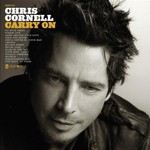Carry On
Studio Album by Chris Cornell released in 2007Carry On review
Chris Cornell's second solo work
From the early teen ages Chris Cornell has suffered from parturiency which has found reflection in his musical career throughout. Mosltly known as former Soundgarden frontman he joined supergroup Audioslave in 2001 and took part in several other projects. Yet the musician is not a man to stick to one direction as probably his Audioslave band mates have expected and this February he left the supergroup because of musical differences. Cornell's recent most well-known achievement is the participation in James Bond Casino Royal soundtrack with epic composition You Know My Name included in his second solo album Carry On. The record is sure to surprise quite a number of his fans. The thing is that on Carry On Chris Cornell has not only recorded some material of his typical massive rock, but also experimented with style, turning at various points to more pop or even R&B like sounding. The new album's producer is Steve Lillywhite and there is a number of guest musicians to collaborate with Cornell, such as famous Gary Lucas, jazz bassist Miles Mosley and drummer Nir Zidkyahu.
On Carry On mood changes from one song to another
Unlike other Chris Cornell's works most of which are characterized with oppression and pessimism the variety of mood on Carry On makes it quite difficult to define the general slant of the album. The opener No Such Thing is the one that most of the fans would expect from the performer with such vocal ability as Cornell's and vividly reminds of what he did with Soundgarden and Audioslave. Lyrically rather strange song Poison Eye presents a piece of classic rock, while another single Arms Around Your Love is a typical creation for stadiums – with powerful chorus and amazing drum work. The changes first appear on bluesy track Safe And Sound, which for some might remind of Eric Clapton, but this is only the preparation. On melodious composition She'll Never Be Your Man Cornell promises his girlfriend that nothing will come of her affair with another woman, and on Killing Birds, which is rather a pop song, the singer demonstrates the wide range of his voice against the background of light accompaniment. One of the greatest surprises on Carry On is the cover of Michael Jackson's famous hit Billie Jean: it is difficult to recognize the song at once for it sounds like a new rock ballad and the emotion Cornell has given to it strengthen the impression of this novelty. On brilliantly arranged track Scar On The Sky Cornell reveals his command of psychodelic style, and the epic compositions Silence The Voices and You Know My Name showcase that the singer has not forgotten how to sound emotional and weighty at the same time.
Chris Cornell's performance never ceases to evolve
No matter what the evil tongues will say Chris has all the rights to try his hand at something different from what he has been doing all the time before. Whichever style he sings his flawless vocals are recognizable as ever, and he just keeps looking for the ways to arrange this or that melody. Carry On is interesting beyond all doubt and deserves praise. Each track has got its own zest, all are made absolutely professionally and one should not forget that lately Cornell writes all the creations himself. The point with the new album is that one had better not expect anything from it and just take it as it is – a different way to look at Chris Cornell's creative work. With such an approach the record reveals a great deal of most unusual moments, and superb instrumental background surprises with every following track. There is no need to say that Cornell's performance never ceases to evolve. Half of the songs want more than one listening to grow on you, and by the end of Carry On it is impossible to understand which of its aspects you like best of all. And even if Carry On is not Chris Cornell's best album, it is definitely the most interesting and complex one.

